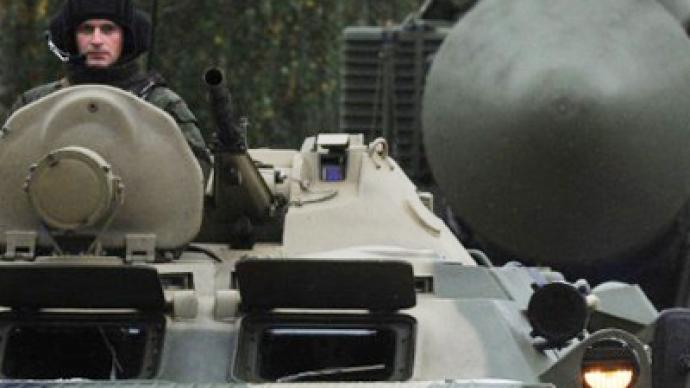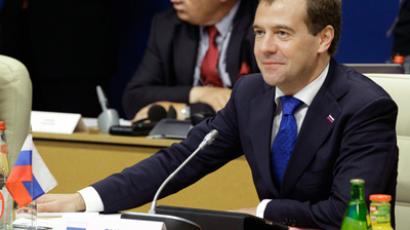Russia warns US missile defense project outpacing dialogue

Moscow says no progress has been made in Russian-U.S. negotiations on missile defense issues, as the US continues implementing the controversial system "faster than the pace of the talks."
"No breakthrough decisions have been adopted,” Russian Deputy Defense Minister Anatoly Antonov told journalists on Tuesday. At the same time, he noted, “our American partners continue implementing their plans concerning the creation of the European segment of the American missile defense shield.”He then said it was inaccurate to suggest that it was NATO that is solely responsible for pushing the project forward.This is not "NATO's missile defense system," he stressed. "That is nonsense.”“In reality, it is the Americans who are implementing their plans in Europe. Regrettably, the implementation of these missile defense plans is seriously outpacing the dialogue that Russia, the U.S. and NATO have been holding in this area," the deputy minister said.Meanwhile, Russia's NATO ambassador and the Russian president's special envoy for missile defense, Dmitry Rogozin, has denied an Iranian newspaper's claim that Russia, Iran and China will cooperate to build their own missile defense shield. The Tehran Times newspaper, citing anonymous sources, claimed that Rogozin planned to discuss this topic during his upcoming visit to Tehran. Rogozin, pointing to Iran’s lack of technical expertise in this field, among other factors, rejected the claim."The Russian Federation could agree to hold talks on the creation of a missile defense system only with countries that have such potential and such scientific and technological developments,” the Russian official told Interfax. “But we cannot hold such talks with countries that do not have this potential.”Rogozin then went one step further in his rejection of the Iranian assertion, saying such cooperation requires “allied relations.”"Furthermore, the creation of a missile defense shield requires the presence of allied relations,” he said. “Iran is our neighbor and partner, but it is not our military ally because it is not a member of the CSTO [Collective Security Treaty Organization]. That is why I can say that the Russian Federation is not holding such talks with Iran and China." Iran had been hoping to purchase from Russia the S-300 antiaircraft missile system, but that deal fell through in the eleventh hour of negotiations.In September, President Dmitry Medvedev signed an order banning the sale of the highly sophisticated weapon systems to the Islamic republic. The contract, signed in 2007, was worth an estimated $800 million and obliged Russia to provide Iran with at least five S-300 systems. Moscow, however, decided against delivery of the weapon systems after the UN Security Council slapped further sanctions against Iran over its nuclear program. Iranian President Mahmoud Ahmadinejad, irate over the decision, said that Iran is "capable of defending itself without the Russian missile systems."Several countries, specifically Israel and the United States, suspect the Islamic republic of building a nuclear weapons program under the guise of a civilian energy project. Tehran vehemently denies the charges, which it calls hypocritical since its main competitor in the region, Israel, is also known to have nuclear weapons.Meanwhile, Rogozin plans to make an announcement about talks between Russia and the Alliance on the question of European missile defense at a session of the Russia-NATO Council at the level of ambassadors on Wednesday.At the session "[NATO] Secretary General Anders Fogh Rasmussen plans to outline NATO's vision of the course of missile defense negotiations between Russia and the US, as well as between Russia and the alliance," Rogozin told Interfax."Consequently, I will also make an announcement. In particular, I will express certain complaints in relation to our partners that emerged during recent talks," he said.The Russian envoy said the meeting was designed to lay the groundwork for crucial upcoming meetings, including one between the Russian and American leaders."This conversation will take place ahead of a meeting of the defense ministers of the alliance's member states in Brussels, as well as prior to a Russian-American meeting at the highest level between Presidents Dmitry Medvedev and Barack Obama, who are also expected to address the problem of missile defense in light of preparations for a possible Russia-NATO summit," the Russian diplomat said.Rogozin said that in the course of the Russia-NATO Council's session, he would also hold a series of meetings with his counterparts from different countries as a follow-up to his recent visits to several NATO member countries, which included talks with military and political leaders.On Wednesday evening, Rogozin departs for Lisbon, where he will hold consultations with Portugal's president, foreign minister and senior military officials on Thursday.Robert Bridge, RT














